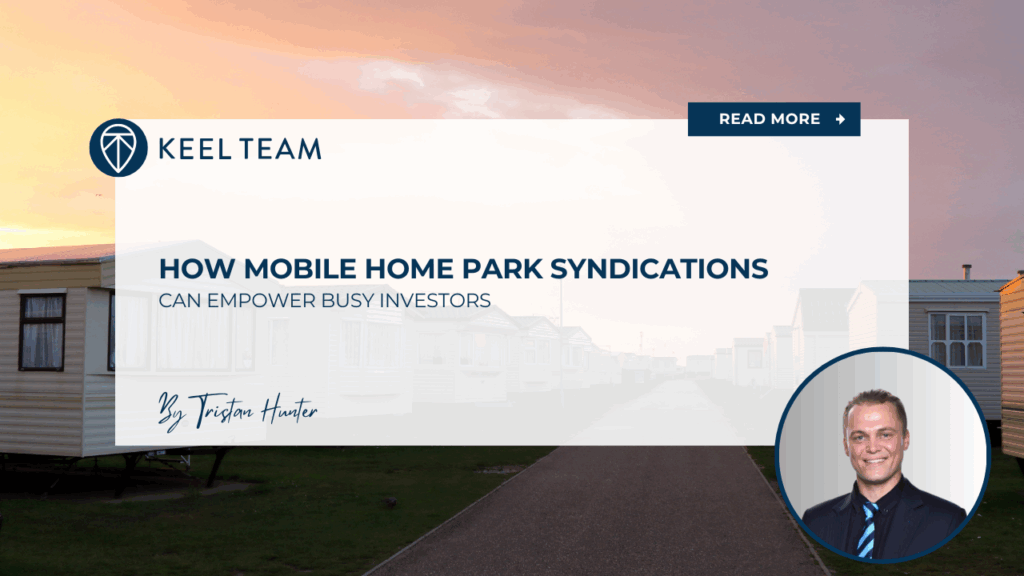How Mobile Home Park Syndications Can Empower Busy Investors
-
 Tristan Hunter - Investor Relations
Tristan Hunter - Investor Relations

Mobile home park investments may offer a compelling path to passive wealth, especially for busy professionals seeking steady returns without hands-on management. Syndications, a structure where investors typically pool capital to acquire and manage properties, help streamline this process. By partnering with experienced sponsors, investors may access the potential benefits of mobile home park ownership—consistent cash flow, recession resistance, and value-add potential—while focusing on their careers. This article explores how mobile home park syndications work, simplifying the 506(b) and 506(c) models, outlining the investor vetting process, and typical returns.
What Is a Mobile Home Park Syndication?
A mobile home park syndication brings together limited partners (LPs) and a general partner (GP) to purchase and operate a property. LPs, the passive investors, contribute capital but delegate management to the GP, also called the sponsor. The sponsor handles acquisition, operations, and strategy, leveraging expertise to maximize returns. This structure may allow busy professionals—doctors, lawyers, or executives—to invest in real estate without diving into the complexities of property management.
Syndications typically target value-add mobile home parks, properties with untapped potential through upgrades like infrastructure improvements or filling vacant lots. As a result, investors may benefit from both monthly cash flow and appreciation upon sale or refinancing.
Download our FREE eBook on the Top 10 things to know BEFORE investing PASSIVELY in mobile home parks!
Why Mobile Home Parks?
Mobile home parks may stand out as a resilient asset class. Demand for affordable housing remains strong, with over 7 million affordable homes needed in the U.S., according to the National Low Income Housing Coalition. Residents often own their homes but rent the land, creating “sticky” tenants who stay long-term, reducing turnover. Additionally, mobile home parks may weather economic downturns better than other real estate types, as people prioritize affordable housing during tough times.
Understanding 506(b) and 506(c) Syndications
Mobile home park syndications often fall under Regulation D of the Securities Act, specifically 506(b) or 506(c) offerings. These frameworks govern how sponsors raise capital while ensuring compliance with securities laws. Here’s a breakdown of each.
506(b) Syndications: Relationship-Based Investing
In a 506(b) syndication, sponsors may raise funds from both accredited and non-accredited investors, though non-accredited investors face stricter limits (up to 35 per deal). An accredited investor typically has an income exceeding $200,000 annually ($300,000 joint) or a net worth over $1 million, excluding their primary residence. The key requirement? Sponsors must have a pre-existing relationship with investors before offering the deal.
This relationship-based approach often fosters trust. Sponsors usually meet investors through networking events, referrals, or prior collaborations. Importantly, 506(b) prohibits general solicitation, meaning sponsors can’t advertise the opportunity publicly. For investors, this may offer a more personalized experience, with direct access to the sponsor’s track record and strategy.
506(c) Syndications: Open to Accredited Investors
Conversely, 506(c) syndications allow sponsors to solicit investments publicly, such as through websites or social media, but only accredited investors may participate. Sponsors must verify accreditation, often through documents like tax returns or financial statements. This model may appeal to investors seeking opportunities without prior connections to the sponsor.
Both structures aim to align interests. Sponsors typically invest their own capital alongside LPs and earn fees (e.g., acquisition or management fees) plus a share of profits, ensuring they prioritize the deal’s success.
The Role of Limited and General Partners
Understanding the roles of LPs and GPs clarifies why syndications suit busy professionals.
Limited Partners: Passive Investors
As an LP, you contribute capital and receive a share of cash flow, tax benefits, and profits upon sale or refinancing. Your role ends there—no need to negotiate deals, manage tenants, or oversee repairs. This hands-off approach may appeal to those with demanding careers. However, LPs bear the risk of capital loss if the deal underperforms, so choosing a reputable sponsor is critical.
General Partners: The Deal Drivers
The GP, or sponsor, does the heavy lifting. They identify undervalued mobile home parks, conduct due diligence (e.g., utility inspections, market analysis), secure financing, and execute the business plan. This might involve upgrading amenities, implementing utility bill-back programs, or boosting occupancy. Their expertise may drive the deal’s success, making their track record a key factor for LPs to evaluate.
The Investor Vetting Process
Sponsors carefully vet investors to ensure alignment and compliance. Here’s how the process typically unfolds.
Step 1: Initial Outreach
For 506(b) deals, sponsors reach out to their network—think industry conferences, investor meetups, or warm introductions. In 506(c) deals, investors may discover opportunities through webinars, podcasts, or online platforms. Either way, sponsors provide an overview, often via a private placement memorandum (PPM), detailing the property, business plan, and projected returns.
Step 2: Accreditation Verification
For 506(c) syndications, sponsors verify accreditation, requesting documents like W-2s or brokerage statements. In 506(b) deals, non-accredited investors may need to disclose financial details to confirm suitability. This step ensures compliance with SEC regulations.
Step 3: Investor Q&A
Sponsors host calls or meetings to answer questions. Investors might ask about the sponsor’s experience, the mobile home park’s value-add potential, or exit strategies (e.g., sale in 5–7 years). Transparent sponsors share past performance data, though they can’t guarantee future results.
Step 4: Commitment and Documentation
Once satisfied, investors sign a subscription agreement and transfer funds. The sponsor finalizes the deal, often placing investor capital in escrow until closing. This process may take weeks, depending on the deal’s complexity.

Typical Returns in Mobile Home Park Syndications
Returns vary based on the property, market, and sponsor’s strategy, but mobile home park syndications often aim for attractive metrics. Here’s a snapshot of potential returns, though past performance doesn’t guarantee future results.
Cash-on-Cash Returns
Many syndications target 8–12% annual cash-on-cash returns, paid monthly or quarterly. For example, a $100,000 investment might yield $8,000–$12,000 in yearly distributions, driven by lot rent and operational efficiencies.
Internal Rate of Return (IRR)
The IRR, which factors in cash flow and profits from sale or refinancing, often ranges from 12–20% over 5–7 years. Value-add strategies—like raising rents to market rates or filling vacant lots—may boost IRR by increasing the property’s net operating income.
Equity Multiple
Sponsors may project an equity multiple of 1.5x–2x, meaning a $100,000 investment could return $150,000–$200,000, including capital, over the hold period. This depends on market conditions and the sponsor’s execution.
Common Tax Benefits
Mobile home parks may offer depreciation deductions, reducing taxable income. Some syndications pass these benefits to LPs, though investors should consult tax advisors.
Risks to Consider
While appealing, mobile home park syndications carry risks. Property values may stagnate, unexpected repairs (e.g., sewer line failures) could eat into profits, or economic shifts might affect tenant demand. Illiquidity is another factor—capital is typically tied up for years. Choosing a sponsor with a proven track record and a conservative underwriting approach may mitigate these risks.
Is Mobile Home Park Syndication Right for You?
If you’re a busy professional seeking passive income, mobile home park syndications may align with your goals. They can offer exposure to a stable asset class without the headaches of direct ownership. However, success often hinges on partnering with a trustworthy sponsor. Research their experience, review past deals, and ask tough questions during vetting.
To get started, attend real estate investment meetups, explore 506(c) offerings online, or connect with sponsors through referrals. Mobile home park syndications may not guarantee wealth, but with due diligence, they could become a cornerstone of your passive investment strategy.
Are you looking for MORE information? Book a 1-on-1 consultation with Andrew Keel to discuss:
- A mobile home park deal review
- Due diligence questions
- How to raise capital from investors
- Mistakes to avoid, and more!
Disclaimer:
The information provided is for informational purposes only and is not investment advice or a guarantee of any kind. We do not guarantee profitability. Make investment decisions based on your research and consult registered financial and legal professionals. We are not registered financial or legal professionals and do not provide personalized investment recommendations.

Tristan Hunter - Investor Relations
View The Previous or Next Post
Subscribe Below 👇





